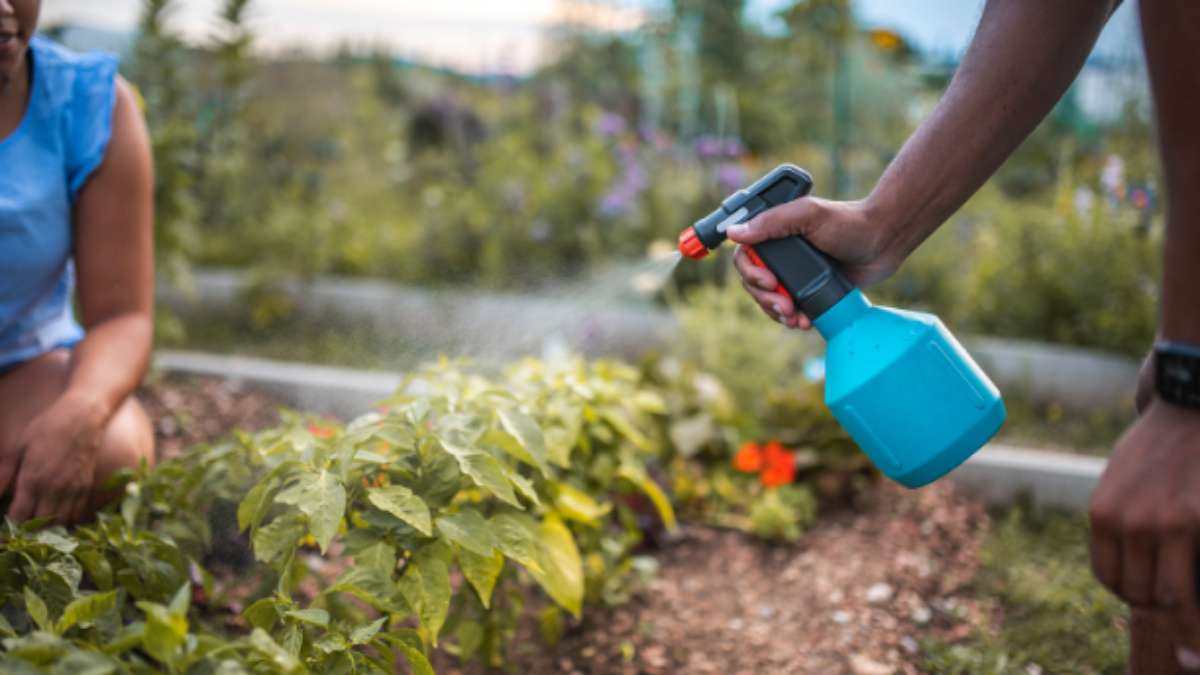Growing tomatoes at home is a rewarding experience, but pests can often threaten your crop. Instead of turning to chemical pesticides, consider using natural alternatives that are safe for your plants, beneficial insects, and the environment. This guide will introduce you to effective homemade pesticides, how to apply them, and tips for maintaining a healthy tomato garden.
🧪 Why Choose Natural Pesticides?
Natural pesticides are derived from plants, minerals, or other non-synthetic sources. They offer several benefits:
-
Safety: Non-toxic to humans and pets when used correctly.
-
Eco-friendly: Biodegradable and less harmful to beneficial insects.
-
Cost-effective: Often made from common household ingredients.naturalgardenguard.com+9Real Simple+9Garden Guides+9The SpruceThe Spruce+6Zameen.com+6Garden Season+6
By using natural pesticides, you can protect your tomato plants without compromising the health of your garden ecosystem.
🧄 1. Garlic and Onion Spray
Garlic and onions have strong scents that deter a range of pests, from aphids to beetles. This spray is particularly effective for vegetable gardens.naturalgardenguard.com+1Better Homes & Gardens+1
Recipe:
-
1 garlic bulb
-
1 small onion
-
1 teaspoon of cayenne pepper (optional for extra kick)
-
1 quart of water
-
A drop of mild dish soapComplete Gardening+14naturalgardenguard.com+14biopests.com+14
Instructions:
-
Blend the garlic, onion, and cayenne pepper with water until smooth.
-
Let it sit for an hour, then strain the mixture into a spray bottle.
-
Add a drop of dish soap, shake, and apply to plants.iDiva+2naturalgardenguard.com+2biopests.com+2
Tip: This spray can last up to a week if stored in the refrigerator. naturalgardenguard.com
🌶️ 2. Hot Pepper Spray
Capsaicin, found in hot peppers, is a natural deterrent for insects like caterpillars, ants, and beetles.naturalgardenguard.com+1iDiva+1
Recipe:
-
2 tablespoons of hot pepper flakes or 2 fresh hot peppers
-
1 quart of water
-
2 drops of mild dish soapnaturalgardenguard.com
Instructions:
-
Boil water and add hot pepper flakes or chopped peppers.
-
Let the mixture cool, then strain into a spray bottle.
-
Add dish soap, shake, and spray on plants.The Spruce+2naturalgardenguard.com+2biopests.com+2
Caution: Wear gloves when handling hot peppers, and avoid spraying near your eyes or face! Zameen.com+4naturalgardenguard.com+4biopests.com+4
🧼 3. Insecticidal Soap
Insecticidal soaps are effective against numerous garden pests, especially tiny mites, aphids, and scales. When poured over tomato plants, the soaps smother the pests and kill off their eggs and larvae on the plants and in the soil. Furthermore, these soaps have no adverse effect on the plants themselves and are safe around humans and animals. Any natural, non-toxic soap works for this purpose, as does liquid dish soap. Garden Guides
🌿 4. Diatomaceous Earth
Diatomaceous earth is a fine powder made from the fossilized remains of tiny aquatic organisms called diatoms. It works by dehydrating insects with exoskeletons, such as hornworms and slugs.biopests.com
Application:
-
Sprinkle diatomaceous earth around the base of your tomato plants.
-
Reapply after rain or watering.biopests.com+1iDiva+1Real Simple
Note: Ensure you’re using food-grade diatomaceous earth to avoid harmful chemicals.
🌼 5. Companion Planting
Planting certain herbs and flowers alongside your tomatoes can naturally repel pests and attract beneficial insects.
Effective companions include:
-
Basil: Repels mosquitoes and flies.
-
Marigolds: Deter nematodes and aphids.
-
Nasturtiums: Act as trap crops for aphids and whiteflies. Complete Gardening+2Southern Living+2iDiva+2
Integrating these plants into your garden can enhance pest control and promote a balanced ecosystem.
🧪 6. Chrysanthemum Flower Tea
Chrysanthemum flowers contain pyrethrum, a compound toxic to insects. Brewing a tea from these flowers can create a potent natural pesticide.NDTV Food
Recipe:
-
Boil dried chrysanthemum flowers in water for about 20 minutes.
-
Strain and cool the mixture.
-
Add a few drops of dish soap to help the solution adhere to plant surfaces.The Spruce+2NDTV Food+2biopests.com+2
Storage: This solution can be stored for up to two months. NDTV Food+1The Spruce+1
🧪 7. Eucalyptus Oil Spray
The strong smell of eucalyptus oil deters insects and bugs. All you need to do is to spray some oil on your plants and see the results. Make sure you use it regularly. NDTV Food
🧪 8. Rhubarb Spray
Rhubarb leaves contain oxalic acid, which can be toxic to pests. Boiling the leaves creates a potent spray.
